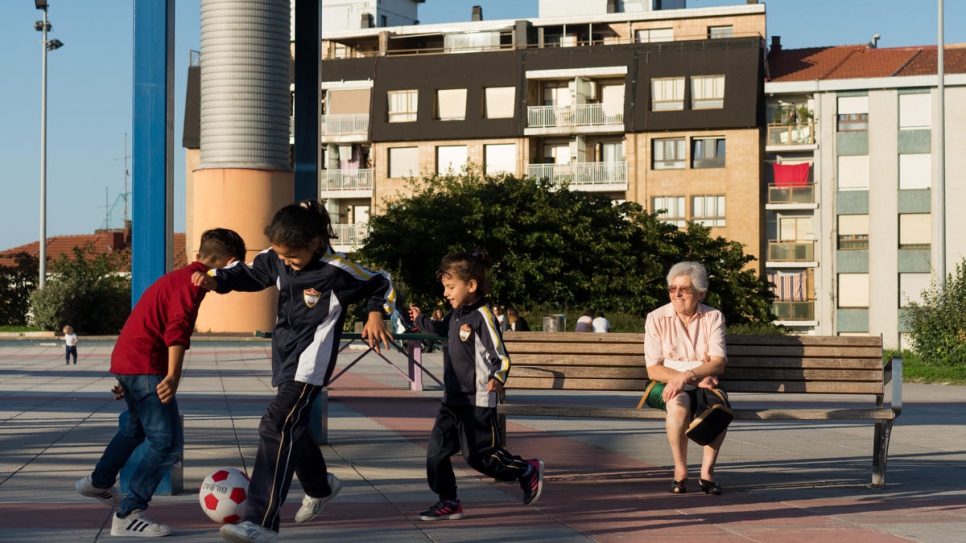When Begoña Herrero volunteered to help a refugee family settle in her hometown in northern Spain, she did not expect it would also change her own life for the better.
At 78, she had retired from her job as an auxiliary nurse and was living with her sister in an apartment.
The refugee family – Minwer, his wife Wafaa and their children Adnan, Sidra, Mashael and Sham – arrived from Jordan in April and moved in nearby. Begoña set to work as part of a team of local volunteers and soon became involved day-to-day with the family’s life. She would drop by their apartment, look after the children while the parents learned Spanish and help them get around the city. What started as volunteer work quickly became friendship.
“People say to me: ‘What are you doing helping those people?’ and I say: ‘It is more what are they doing for me?’ They change you and help you think in a different way,” said Begoña.
"We arrived and saw the welcome they gave us."
Begoña is a sponsor with a community sponsorship pilot programme that aims to provide wrap-around care to five families of refugees as they settle in the Basque Country, an autonomous community in northern Spain. The project is supported by the NGO Cáritas and the Ellacuría Foundation. The families receive help with getting to language classes and the doctor, doing school runs and getting to know their neighbours. The aim is to give them a sense of community.
“We were so surprised when we arrived and saw the welcome they gave us,” said Minwer.
Community sponsorship programmes have taken root in other European countries, but the one in the Basque region is the first of its kind in Spain. It stems from a collaboration between civil society groups, central and regional governments and UNHCR, the UN Refugee Agency.
Karmele Villarroel of the Ellacuría Foundation, which provides technical support to sponsors, says good relations between the family and the neighbourhood are crucial if more communities are to emulate the programme.
“The family are doing well in the neighbourhood and this … will mean that other families who have this support from sponsors around them will already have an experience to relate to,” said Karmele.
The Basque region endured the harsh reality of Spain’s 1936-1939 civil war, as did many other regions. The conflict’s barbarity was immortalized in Pablo Picasso’s Guernica, painted in May 1937, soon after the small Basque city of that name was bombed. The painting helped sensitize people to the importance of welcoming people who have fled war, Villarroel said.
The experience of Minwer and Wafaa’s family shows how war can tear a family apart. It is a sobering reminder of what some refugees suffer, but it also shows how being welcomed can offer a fresh start.
"I was living in fear."
Before the war began Minwer, 36, and Wafaa, 34, lived with their four children in the city of Homs. He worked first as a labourer and then he made Syrian pastries. Their lives changed one day in September 2011. A shell hit an upstairs room in their house during a huge street protest. His three-year-old boy was killed and his baby daughter was critically wounded and died shortly after. The family fled, fearing for their lives.
What followed was a dark time as the family struggled with insecurity, hunger, poverty, injury and, above all, grief.
“I was living in fear … I was afraid to sleep at night. Two years was like 100 years,” Minwer said.
Eventually, they made their way across the border to Jordan. When staff from UNHCR saw the state they were in they immediately sent them to hospital. For three years they lived first at Za’atari camp and then in a flat in the city of Mafraq, with further assistance from UNHCR. Last year they were told about the possibility of moving to Spain.
Resettlement to a third country is crucial for some refugees, who may not find safety or stability in the country to which they originally fled. Resettlement is one of the long-term solutions that will be a high priority when government ministers from around the world meet at the Global Refugee Forum in Geneva in December. In practice, however, resettlement is rare and depends on the generosity of host countries.
"I felt that I had another family in Spain."
The Forum builds on the momentum generated by the Global Compact on Refugees, affirmed last year by the UN General Assembly, and aims to improve the level of international commitment to the more than 70-million people in the world today who have been forced to flee their homes. This successful sponsorship programme is one of the good practices that will be showcased at the Forum, an example of the positive impact that civil society can make in finding solutions for refugees.
Governments have a part to play, but people will always matter.
Minwer said the welcome in Bilbao has been more than he had hoped for. His elder children have joined a local scout group, and the neighbourhood, far from being alien and strange, now feels like a community.
“There was a great pain and wound,” he said. “That pain can’t be forgotten, but there are people who help you to forget that pain, via their actions and their support for our integration, so when I got to know the group, I felt that I had another family in Spain.”
Through the volunteers, the children are getting a fresh start. They already speak Spanish and are learning Basque. They even have what feels like a new family.
When Begoña comes to the flat, they call her ‘grandma’.




